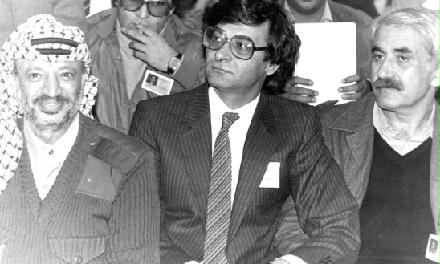|
Anton Shammas
Anton Shammas ( ar, أنطون شماس, he, אנטון שמאס; born 1950), is a Palestinian writer, poet and translator of Arabic, Hebrew and English. Biography Anton Shammas was one of six children born to a Palestinian father and a Lebanese mother, who moved to Fassuta in northern Palestine in 1937 to teach at the local girls' school. In 1962, the family moved to Haifa where Shammas studied in an integrated Jewish-Arab high school. In 1968, Shammas moved to Jerusalem and studied English and Arabic literature and art history at the Hebrew University of Jerusalem. Shammas left Jerusalem in 1987 and now lives in the United States, where he is a professor of Comparative Literature and Near Eastern Studies at the University of Michigan. Literary career Shammas was one of the founders of the Arabic magazine "The East" (Arabic: الشرق), which he edited from 1971 to 1976. His first poem was published in the literary supplement of Haaretz newspaper. In 1974, Shammas published h ... [...More Info...] [...Related Items...] OR: [Wikipedia] [Google] [Baidu] |
Palestinians
Palestinians ( ar, الفلسطينيون, ; he, פָלַסְטִינִים, ) or Palestinian people ( ar, الشعب الفلسطيني, label=none, ), also referred to as Palestinian Arabs ( ar, الفلسطينيين العرب, label=none, ), are an ethnonational group descending from peoples who have inhabited the region of Palestine over the millennia, and who are today culturally and linguistically Arab. Despite various wars and exoduses, roughly one half of the world's Palestinian population continues to reside in the territory of former British Palestine, now encompassing the West Bank and the Gaza Strip (the Palestinian territories) as well as Israel. In this combined area, , Palestinians constituted 49 percent of all inhabitants, encompassing the entire population of the Gaza Strip (1.865 million), the majority of the population of the West Bank (approximately 2,785,000 versus some 600,000 Israeli settlers, which includes about 200,000 in East Jerusalem) ... [...More Info...] [...Related Items...] OR: [Wikipedia] [Google] [Baidu] |
The Secret Life Of Saeed The Pessoptimist
''The Secret Life of Saeed: The Pessoptimist'' ( ar, الوقائع الغريبة في اختفاء سعيد أبي النحس المتشائل) is a 1974 satirical fiction book by Emile Habibi. The novel's name comes from merging the Arabic words for pessimist (al-mutasha'im المتشائم) and optimist (al-mutafa'il المتفائل), to describe the narrator Saeed's unique way of viewing the world. Saeed, the novel's narrator, frequently recounts tragic events related to his family and the plight of Palestinians, but adds in comic flourishes to show his "optimistic" side. Narrative and Plot Habibi used a comic mode to mitigate the intensity of his world in Israel and to make the story easier for readers to understand. This would have been more difficult had he used a straightforward historical narrative. Habiby showed his resistance against oppressive Israeli policies by using Arabic literary expressions and traditions. The story begins with a Palestinian man named Saeed, w ... [...More Info...] [...Related Items...] OR: [Wikipedia] [Google] [Baidu] |
1950 Births
Year 195 ( CXCV) was a common year starting on Wednesday (link will display the full calendar) of the Julian calendar. At the time, it was known as the Year of the Consulship of Scrapula and Clemens (or, less frequently, year 948 '' Ab urbe condita''). The denomination 195 for this year has been used since the early medieval period, when the Anno Domini calendar era became the prevalent method in Europe for naming years. Events By place Roman Empire * Emperor Septimius Severus has the Roman Senate deify the previous emperor Commodus, in an attempt to gain favor with the family of Marcus Aurelius. * King Vologases V and other eastern princes support the claims of Pescennius Niger. The Roman province of Mesopotamia rises in revolt with Parthian support. Severus marches to Mesopotamia to battle the Parthians. * The Roman province of Syria is divided and the role of Antioch is diminished. The Romans annexed the Syrian cities of Edessa and Nisibis. Severus re-establish ... [...More Info...] [...Related Items...] OR: [Wikipedia] [Google] [Baidu] |
Palestinian Christians
Palestinian Christians ( ar, مَسِيحِيُّون فِلَسْطِينِيُّون, Masīḥiyyūn Filasṭīniyyūn) are Christian citizens of the State of Palestine. In the wider definition of Palestinian Christians, including the Palestinian refugees, diaspora and people with full or partial Palestinian Christian ancestry this can be applied to an estimated 500,000 people worldwide as of 2000. Palestinian Christians belong to one of a number of Christian denominations, including Eastern Orthodoxy, Oriental Orthodoxy, Catholicism (Eastern and Western rites), Anglicanism, Lutheranism, other branches of Protestantism and others. Bernard Sabella of Bethlehem University estimates that 6% of the Palestinian population worldwide is Christian and that 56% of them live outside of the region of Palestine. In both the local dialect of Palestinian Arabic and in Classical Arabic or Modern Standard Arabic, Christians are called ''Nasrani'' (the Arabic word Nazarene) or ''Masihi'' (a ... [...More Info...] [...Related Items...] OR: [Wikipedia] [Google] [Baidu] |
Elias Khoury (writer)
Elias Khoury ( ar, إلياس خوري; born 12 July 1948) is a Lebanese novelist, and prominent public intellectual. Accordingly, he has published myriad novels related to literary criticism, which have been translated into several foreign languages, including English. Khoury has also written three plays and two screenplays. Khoury has been an editor of famous Lebanese newspapers. Between 1993 and 2009, he served as an editor of ''Al-Mulhaq'', the weekly cultural supplement of the Lebanese daily newspaper '' Al-Nahar.'' He also taught at universities in some Arab and European countries, and the United States. Biography Early life Elias Khoury was born in 1948 into a Greek Orthodox middle-class family in the predominantly Christian Ashrafiyye district of Beirut. He was a left-handed and never liked being one. At the age of 8, he started enjoying Jurji Zaydan's readings which, later on, taught him more about Islam and his Arabic background. Eventually, Elias stopped reading ... [...More Info...] [...Related Items...] OR: [Wikipedia] [Google] [Baidu] |
Athol Fugard
Athol Fugard, Hon. , (born 11 June 1932), is a South African playwright, novelist, actor, and director widely regarded as South Africa's greatest playwright. He is best known for his political and penetrating plays opposing the system of apartheid and for the 2005 Oscar-winning film of his novel ''Tsotsi'', directed by Gavin Hood. Acclaimed as "the greatest active playwright in the English-speaking world" by '' Time'' in 1985, Fugard continues to write and has published more than thirty plays. Fugard was an adjunct professor of playwriting, acting and directing in the Department of Theatre and Dance at the University of California, San Diego. He is the recipient of many awards, honours, and honorary degrees, including the 2005 Order of Ikhamanga in Silver "for his excellent contribution and achievements in the theatre" from the government of South Africa. He is also an Honorary Fellow of the Royal Society of Literature. Fugard was honoured in Cape Town with the opening ... [...More Info...] [...Related Items...] OR: [Wikipedia] [Google] [Baidu] |
Edward Albee
Edward Franklin Albee III ( ; March 12, 1928 – September 16, 2016) was an American playwright known for works such as '' The Zoo Story'' (1958), '' The Sandbox'' (1959), '' Who's Afraid of Virginia Woolf?'' (1962), '' A Delicate Balance'' (1966), and ''Three Tall Women'' (1994). Some critics have argued that some of his work constitutes an American variant of what Martin Esslin identified and named the Theater of the Absurd. Three of his plays won the Pulitzer Prize for Drama, and two of his other works won the Tony Award for Best Play. His works are often considered frank examinations of the modern condition. His early works reflect a mastery and Americanization of the Theatre of the Absurd that found its peak in works by European playwrights such as Samuel Beckett, Eugène Ionesco, and Jean Genet. His middle period comprised plays that explored the psychology of maturing, marriage, and sexual relationships. Younger American playwrights, such as Paula Vogel, credit Albe ... [...More Info...] [...Related Items...] OR: [Wikipedia] [Google] [Baidu] |
Harold Pinter
Harold Pinter (; 10 October 1930 – 24 December 2008) was a British playwright, screenwriter, director and actor. A Nobel Prize winner, Pinter was one of the most influential modern British dramatists with a writing career that spanned more than 50 years. His best-known plays include '' The Birthday Party'' (1957), '' The Homecoming'' (1964) and '' Betrayal'' (1978), each of which he adapted for the screen. His screenplay adaptations of others' works include '' The Servant'' (1963), ''The Go-Between'' (1971), '' The French Lieutenant's Woman'' (1981), '' The Trial'' (1993) and '' Sleuth'' (2007). He also directed or acted in radio, stage, television and film productions of his own and others' works. Pinter was born and raised in Hackney, east London, and educated at Hackney Downs School. He was a sprinter and a keen cricket player, acting in school plays and writing poetry. He attended the Royal Academy of Dramatic Art but did not complete the course. He was fined ... [...More Info...] [...Related Items...] OR: [Wikipedia] [Google] [Baidu] |
Samuel Beckett
Samuel Barclay Beckett (; 13 April 1906 – 22 December 1989) was an Irish novelist, dramatist, short story writer, theatre director, poet, and literary translator. His literary and theatrical work features bleak, impersonal and tragicomic experiences of life, often coupled with black comedy and nonsense. It became increasingly minimalist as his career progressed, involving more aesthetic and linguistic experimentation, with techniques of repetition and self-reference. He is considered one of the last modernist writers, and one of the key figures in what Martin Esslin called the Theatre of the Absurd. A resident of Paris for most of his adult life, Beckett wrote in both French and English. During the Second World War, Beckett was a member of the French Resistance group Gloria SMH (Réseau Gloria). Beckett was awarded the 1969 Nobel Prize in Literature "for his writing, which—in new forms for the novel and drama—in the destitution of modern man acquires its elevatio ... [...More Info...] [...Related Items...] OR: [Wikipedia] [Google] [Baidu] |
Dario Fo
Dario Luigi Angelo Fo (; 24 March 1926 – 13 October 2016) was an Italian playwright, actor, theatre director, stage designer, songwriter, political campaigner for the Italian left wing and the recipient of the 1997 Nobel Prize in Literature. In his time he was "arguably the most widely performed contemporary playwright in world theatre".Mitchell 1999, p. xiii Much of his dramatic work depends on improvisation and comprises the recovery of "illegitimate" forms of theatre, such as those performed by '' giullari'' (medieval strolling players) and, more famously, the ancient Italian style of '' commedia dell'arte''. His plays have been translated into 30 languages and performed across the world, including in Argentina, Bulgaria, Canada, Chile, Iran, the Netherlands, Poland, Romania, South Africa, South Korea, Spain, Sri Lanka, Sweden, the United Kingdom, the United States and Yugoslavia. His work of the 1960s, 1970s and 1980s is peppered with criticisms of assassinations, corrupt ... [...More Info...] [...Related Items...] OR: [Wikipedia] [Google] [Baidu] |
Mahmoud Darwish
Mahmoud Darwish ( ar, محمود درويش, Maḥmūd Darwīsh, 13 March 1941 – 9 August 2008) was a Palestinian poet and author who was regarded as the Palestinian national poet. He won numerous awards for his works. Darwish used Palestine as a metaphor for the loss of Eden, birth and resurrection, and the anguish of dispossession and exile. Maya Jaggi"Profile: Mahmoud Darwish – Poet of the Arab world" ''The Guardian'', 8 June 2002. He has been described as incarnating and reflecting "the tradition of the political poet in Islam, the man of action whose action is poetry.""Prince of Poets" ''The American Scholar''. He also served as an editor for several literary magazines in Palestine. Biography Mahmoud Darwish was born in 1941 in[...More Info...] [...Related Items...] OR: [Wikipedia] [Google] [Baidu] |


(Cropped).jpg)




